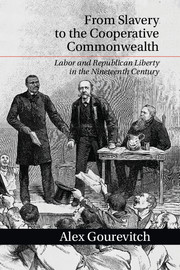Crossref Citations
This Book has been
cited by the following publications. This list is generated based on data provided by Crossref.
Eidlin, Barry
2016.
Why Is There No Labor Party in the United States? Political Articulation and the Canadian Comparison, 1932 to 1948.
American Sociological Review,
Vol. 81,
Issue. 3,
p.
488.
Haugaard, Mark
and
Pettit, Philip
2017.
A conversation on power and republicanism: an exchange between Mark Haugaard and Philip Pettit.
Journal of Political Power,
Vol. 10,
Issue. 1,
p.
25.
Eidlin, Barry
2017.
Election 2016: Labor, Politics, and the Imperative of Organization.
Labor Studies Journal,
Vol. 42,
Issue. 3,
p.
226.
Rahman, K Sabeel
2017.
Democracy against domination: Contesting economic power in progressive and neorepublican political theory.
Contemporary Political Theory,
Vol. 16,
Issue. 1,
p.
41.
Manski, Sarah
2017.
Building the blockchain world: Technological commonwealth or just more of the same?.
Strategic Change,
Vol. 26,
Issue. 5,
p.
511.
Aitchison, Guy
2017.
Three Models of Republican Rights: Juridical, Parliamentary and Populist.
Political Studies,
Vol. 65,
Issue. 2,
p.
339.
Deranty, Jean-Philippe
2017.
En quels sens le travail vivant est-il une catégorie politique ?.
Travailler,
Vol. n° 36,
Issue. 2,
p.
59.
Khachaturian, Rafael
2018.
Statist political science and American Marxism: A historical encounter.
Contemporary Political Theory,
Vol. 17,
Issue. 1,
p.
28.
Muller, Christopher
2018.
Freedom and Convict Leasing in the Postbellum South.
American Journal of Sociology,
Vol. 124,
Issue. 2,
p.
367.
Maya, Gustavo
2019.
Cesar Chavez and the Ethics of Exemplarity.
Journal of Religious Ethics,
Vol. 47,
Issue. 3,
p.
601.
Schemmel, Christian
2019.
The Many Evils of Inequality: An Examination of T. M. Scanlon's Pluralist Account.
Ethics & International Affairs,
Vol. 33,
Issue. 1,
p.
89.
Elazar, Yiftah
and
Rousselière, Geneviève
2019.
Republicanism and the Future of Democracy.
Sharratt, Grant M.
2019.
Free at work, free from work: Nondomination, unions, and basic income.
Journal of Labor and Society,
Vol. 22,
Issue. 3,
p.
607.
Casassas, David
Raventós, Daniel
and
Szlinder, Maciej
2019.
The Palgrave International Handbook of Basic Income.
p.
459.
Borman, David A.
2019.
Axel Honneth and the Critical Theory of Recognition.
p.
97.
Balthrop‐Lewis, Alda
2019.
Exemplarist Environmental Ethics.
Journal of Religious Ethics,
Vol. 47,
Issue. 3,
p.
525.
Taylor, Robert S.
2019.
DELABORING REPUBLICANISM.
Public Affairs Quarterly,
Vol. 33,
Issue. 4,
p.
265.
Mulvad, Andreas Møller
and
Stahl, Rune Møller
2019.
Civilizing left populism: Towards a theory of plebeian democracy.
Constellations,
Vol. 26,
Issue. 4,
p.
591.
Ridley-Duff, Rory
2020.
New co-operativism as social innovation: Progress or regress? .
Journal of Co-operative Studies,
Vol. 53,
Issue. 3,
p.
5.
Spicer, Jason S.
2020.
Worker and Community Ownership as an Economic Development Strategy: Innovative Rebirth or Tired Retread of a Failed Idea?.
Economic Development Quarterly,
Vol. 34,
Issue. 4,
p.
325.



